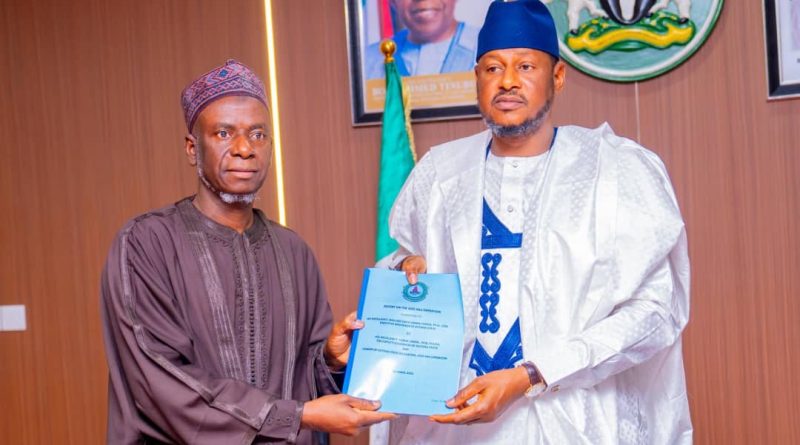Radda receives 2025 Hajj report, orders immediate reforms ahead of 2026 exercise
Katsina State Governor, Dikko Umaru Radda, has received the comprehensive report of the 2025 Hajj operation from the Amirul Hajj and Deputy Governor, Faruk Lawal, with a firm directive for immediate reforms to strengthen coordination, discipline, and service delivery ahead of the 2026 exercise.
Presenting the report Thursday at the Government House, Katsina, the Deputy Governor, who also served as Head of the 2025 State Hajj Delegation, expressed gratitude to the Governor for entrusting him and the committee with such a critical spiritual assignment. He explained that the report captures all activities, achievements, challenges, and recommendations recorded during the just-concluded pilgrimage.
 Mr Faruk Lawal stated that the delegation, inaugurated on 25 April 2025, comprised senior officials and respected figures from different sectors. Members included the Speaker of the Katsina State House of Assembly, Hon Nasiru Yahaya Saif; Justice Aminu Tukur of the State High Court; the Commissioner for Religious Affairs, Ishaq Shehu Dabai; alongside other notable appointees, traditional leaders, and scholars. He added that several sub-committees were established to handle key aspects of the Hajj operation, including coordination, visa and BTA processing, accommodation, feeding, medical services, women’s welfare, transportation, media, and security.
Mr Faruk Lawal stated that the delegation, inaugurated on 25 April 2025, comprised senior officials and respected figures from different sectors. Members included the Speaker of the Katsina State House of Assembly, Hon Nasiru Yahaya Saif; Justice Aminu Tukur of the State High Court; the Commissioner for Religious Affairs, Ishaq Shehu Dabai; alongside other notable appointees, traditional leaders, and scholars. He added that several sub-committees were established to handle key aspects of the Hajj operation, including coordination, visa and BTA processing, accommodation, feeding, medical services, women’s welfare, transportation, media, and security.
Each of these committees, he noted, worked diligently to ensure the welfare, safety, and spiritual comfort of all Katsina pilgrims. According to him, the 2025 Hajj exercise was largely successful, with smooth airlifts, well-organised feeding arrangements, and positive feedback from pilgrims. “All our pilgrims received their full Basic Travelling Allowance (BTA) before departure. The airlift began on 18 May and all flights departed safely.
Despite a few challenges in accommodation and connectivity in Madinah, the exercise remained peaceful, and pilgrims were able to perform their rites successfully,” he said. The Deputy Governor highlighted a few challenges that require urgent attention. These included delays in visa processing for about 92 intending pilgrims, limited access to Saudi medical facilities, inadequate tent space at Mina, and the activities of unregistered currency exchangers at the Hajj camp.
He recommended early hotel reservations close to the Haram, licensing only approved currency operators, and tighter coordination between the Pilgrims Welfare Board and sub-committees to avoid role overlaps. He also proposed that preachers and Hajj officials undergo a minimum of three months of intensive training, followed by two months of practical coordination sessions before departure.
While commending the performance of the state medical and welfare teams, he called for additional personnel, improved infrastructure at the Hajj camp, and stronger security at entry and exit points. Mr Faruk Lawal also praised Governor Radda’s personal visit to the Holy Land, describing it as a source of immense spiritual motivation and morale boost for the pilgrims. “Your Excellency’s presence inspired them and strengthened their faith in our administration’s commitment to their welfare,” he added.
In his response, Governor Radda expressed deep appreciation to Almighty Allah for granting the state a successful Hajj operation and thanked the Amirul Hajj and all members of the delegation for their dedication, hard work, and sincerity of purpose. “I have carefully listened to your presentation and I am pleased with the submissions and recommendations. I commend all those who contributed to making this year’s Hajj exercise smooth and well-organised,” the Governor said.
However, the Governor noted that several challenges highlighted in the report have been recurring issues over the years and must now be decisively addressed. He emphasised that the time has come for both the government and the Pilgrims Welfare Board to clearly define roles and responsibilities to ensure transparency, accountability, and improved service to pilgrims.
Governor Radda strongly cautioned against the misconception that membership of the Pilgrims Welfare Board automatically entitles one to perform Hajj every year. “This service is not a personal privilege; it is a responsibility. Only those who can truly contribute to the welfare of pilgrims should be part of the team. Hajj participation should not be treated as a reward or entitlement,” he said. He also expressed concern over reports of misuse of government vehicles, particularly the ambulance meant for pilgrims, and directed that such matters be properly investigated.
“If there was any complaint, it should have been raised immediately so that the issue could be addressed on time,” he added. The Governor directed the Secretary to the State Government to study the report thoroughly, extract all key recommendations, and ensure that those requiring immediate action are implemented without delay, while policy-level matters should be escalated for executive consideration. He further instructed that preparations for the 2026 Hajj should commence early, with intensified awareness campaigns for intending pilgrims and timely formation of the next delegation to allow adequate training and planning.
Governor Radda also issued a strict directive that no official sponsored by the state government should leave Saudi Arabia before the pilgrims, except in cases of verifiable medical emergencies approved by the appropriate authorities. “We are there to serve the pilgrims. It is only right that officials remain until the last pilgrim departs safely,” he emphasized. The Governor reaffirmed his administration’s commitment to discipline, accountability, and service excellence in all Hajj-related matters, assuring that necessary reforms will be implemented to ensure a more efficient and spiritually fulfilling exercise in 2026.

